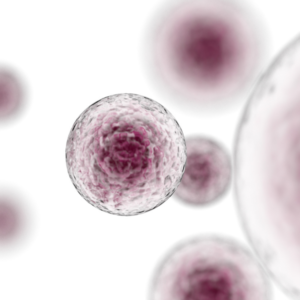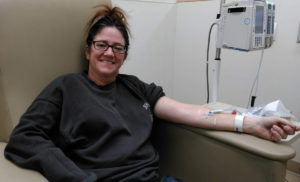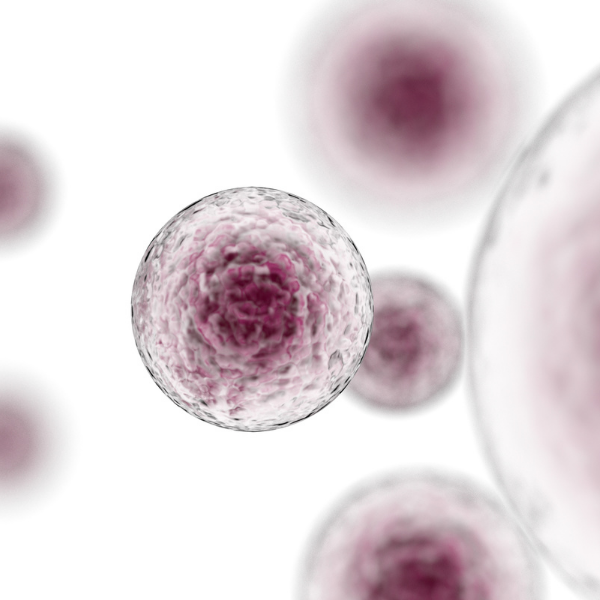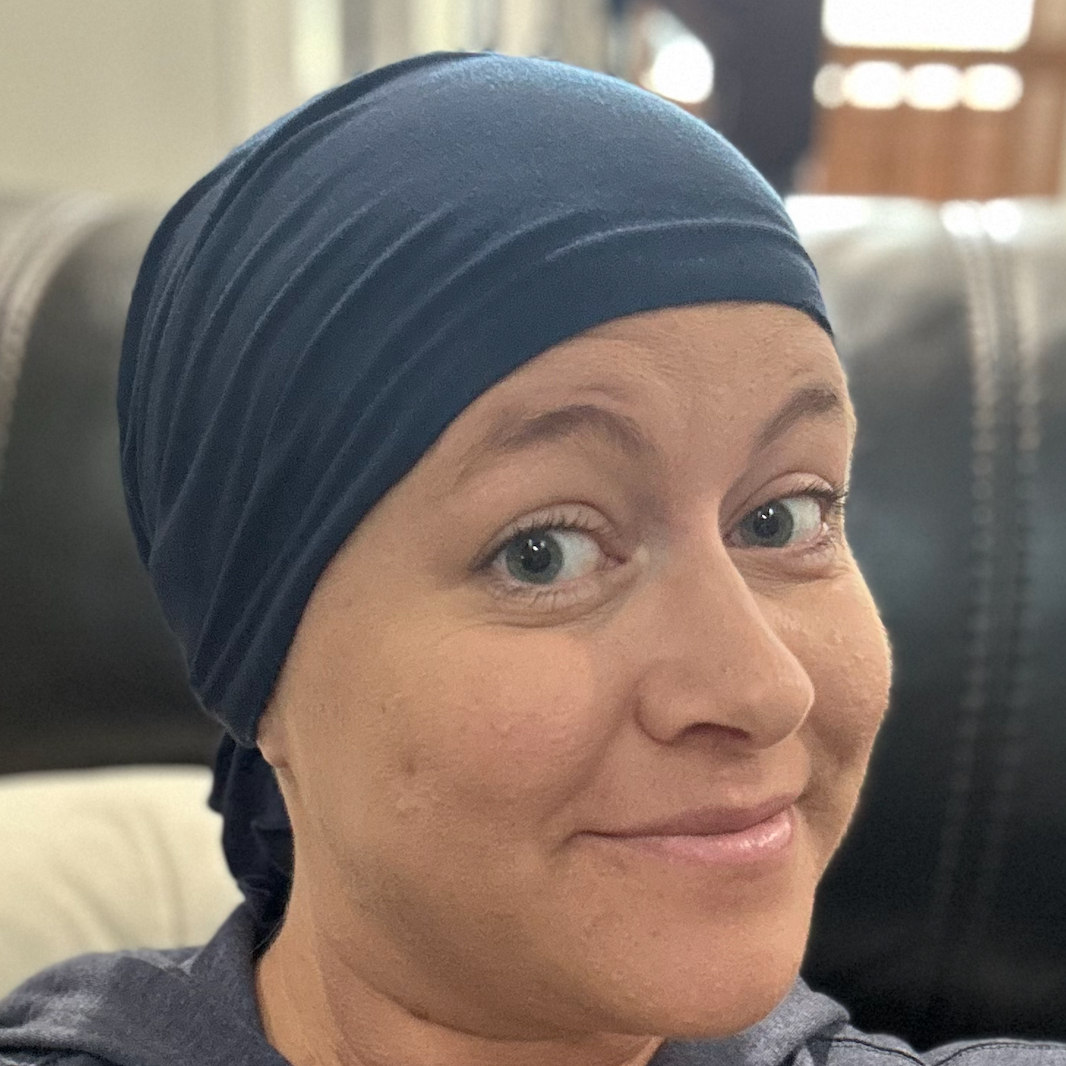Keytruda Side Effects | The Patient Story

The emergence of new immunotherapies brings a renewed sense of hope and possibility for cancer patients. Keytruda (pembrolizumab) is a humanized antibody used to treat various types of cancer, including melanoma, lung cancer, breast cancer, bladder cancer, head and neck cancer, Hodgkin lymphoma, and others.
Keytruda may help the body’s immune system become a cancer-fighting superhero, boosting its ability to seek out and destroy cancer cells.
By understanding Keytruda and its potential benefits, patients can approach their cancer treatment with greater confidence and optimism. In this article, we will provide comprehensive information about Keytruda to help patients make informed decisions about their treatment options.
Following this informative guide, read real-life patient experiences from people who have used Keytruda as a cancer treatment.
Table of Contents

Read Amy’s Story
"I had this sugar rush for a while because all I could eat was ice cream popsicles. That’s the only thing my stomach could handle.[That lasted] the whole time I was on Keytruda.I had a rash on my chest and a little bit on my legs. They itched real bad. I ended up using Aquaphor, which worked well. I also had steroids, in case I needed to take that. I never really did because it never got that bad. They would break open. Almost blistery type. [It was] more of a nuisance. It never went away. It always stayed there until I stopped Keytruda."
What is Keytruda?
Keytruda is an immunotherapy treatment that works by harnessing the power of the body’s own immune system to fight cancer. It belongs to a class of drugs called checkpoint inhibitors. These drugs block proteins called checkpoints that cancer cells use to avoid detection by the immune system. By blocking these checkpoints, Keytruda enables the immune system to recognize and attack cancer cells.
Keytruda Mechanism of Action
Keytruda works by blocking the PD-1 pathway, which is found on certain immune cells called T cells. When cancer cells are present in the body, they can produce a protein called PD-L1, which binds to the PD-1 protein on T cells and inhibits their ability to attack the cancer cells. By blocking the PD-1 protein, Keytruda prevents the cancer cells from hiding and allows your T cells to attack cancer cells.
Immunotherapy drugs like Keytruda are specifically developed to give the immune system a heads-up about those mutated cells, enabling it to track them down and eliminate them.
What is Keytruda Used for?
Keytruda is used to treat various types of cancer. The FDA has approved it for the following types of cancer:
- Melanoma
- Non-small cell lung cancer
- Head and neck cancer
- Hodgkin lymphoma
- Urothelial carcinoma
- Microsatellite instability-high cancer
- Gastric cancer
- Cervical cancer
- Merkel cell carcinoma
- Renal cell carcinoma
Keytruda Treatment
Keytruda is typically administered through an intravenous infusion (IV). The dosage and time of treatment depend on the type of cancer being treated, the aggressiveness of the cancer and the oncologist’s recommendation. Keytruda is usually given every three weeks for up to two years, but the duration of treatment may vary depending on the patient’s response to the medication.
Keytruda Side Effects
Like all medications, Keytruda can cause side effects. The most common side effects of Keytruda include:
- Fatigue
- Nausea
- Diarrhea
- Decreased appetite
- Skin rash
- Itching
- Joint pain
- Shortness of breath
- Cough
Less common side effects of Keytruda include:
- Colitis (inflammation of the colon)
- Hepatitis (inflammation of the liver)
- Pneumonitis (inflammation of the lungs)
- Hypothyroidism (low thyroid function)
- Hyperthyroidism (overactive thyroid function)
- Type 1 diabetes
- Infusion reactions
It is important to notify your doctor immediately if you experience any side effects while taking Keytruda. In some cases, treatment may need to be stopped or adjusted to manage side effects.
Keytruda Cost
The cost of Keytruda can vary depending on the type of cancer being treated, your insurance, and the availability of financial support. However, the cost of treatment can be expensive, with a single dose costing several thousand dollars. The cost of each prescribed dose of Keytruda is $10,897.12 when administered every 3 weeks, while it is $21,794.24 when given every 6 weeks according to the cost listed by the drug’s manufacturer, Merck, in May 2023.
To help patients access Keytruda, Merck offers a patient assistance program. The program provides financial assistance to eligible patients who meet certain criteria, such as having a low income or lack of insurance coverage. In addition, some insurance companies may cover the cost of Keytruda, depending on the patient’s policy.
MORE What Benefits are Available For Cancer Patients?
Signs that Keytruda is Working
Keytruda has shown promising results in clinical trials, but its effectiveness can vary among patients. It is important for patients to recognize the signs that Keytruda is working to ensure they receive the maximum benefit from the treatment. For example, in a clinical trial called KEYNOTE-024, Keytruda demonstrated improved overall survival and reduced disease progression in patients with advanced non-small cell lung cancer. Being aware of these signs and staying informed about clinical trials can help patients make informed decisions about their treatment.
Here are some of the signs that Keytruda is working:
Tumor shrinkage:
According to clinical trials and studies, one of the most noticeable signs that Keytruda is working is tumor shrinkage. Keytruda has demonstrated the ability to reduce the size of tumors in a significant number of patients, sometimes within a few weeks of initiating treatment. This positive outcome can be observed through imaging tests such as CT scans or MRIs. If your doctor detects a decrease in the size of your tumor, it may indicate that Keytruda is effectively working for you.
Improved symptoms:
Keytruda can also lead to the improvement of cancer-related symptoms. For instance, individuals with lung cancer may experience difficulties in breathing, persistent coughing, and chest pain. If you notice a reduction or alleviation of these symptoms after initiating Keytruda treatment, it may indicate that the medication is effectively working for you.
Stable disease:
In some cases, Keytruda may not cause tumors to shrink, but it can prevent them from growing further, leading to a state called stable disease. If your tumor size remains unchanged after commencing Keytruda treatment, it suggests that the medication is effectively working to inhibit further tumor growth.
Increased immune activity:
Keytruda’s mechanism of action involves stimulating the immune system to target and attack cancer cells. A sign that the medication is working is increased immune activity, which can be measured through blood tests that assess the levels of immune cells and proteins in the body. If your doctor observes heightened immune activity following the initiation of Keytruda treatment, it may indicate that the medication is effectively working for you.
Prolonged survival:
A significant goal of cancer treatment is to extend survival. Keytruda has demonstrated the ability to improve survival rates in specific cancer types in clinical trials. If your survival rate increases following the commencement of Keytruda treatment, it suggests that the medication is effectively working for you. When reviewing clinical trials, it’s important to evaluable the study’s sponsers and investigators.
Keytruda Success Rate
In the treatment of metastatic nonsquamous non-small cell lung cancer (NSCLC), Keytruda in combination with pemetrexed and platinum chemotherapy has shown promising results. Data from the KEYNOTE-189 trial revealed a significant five-year overall survival rate of 19.4% for Keytruda combination therapy, compared to 11.3% for chemotherapy alone, reducing the risk of death by 40%.
Similarly, in the KEYNOTE-407 trial, Keytruda combined with carboplatin-paclitaxel or nab-paclitaxel resulted in a five-year overall survival rate of 18.4%, compared to 9.7% for chemotherapy alone, reducing the risk of death by 29%. It is important to consult with your doctor to discuss the success rates of Keytruda in your specific case. Keytruda has also demonstrated significant long-term survival benefits in bladder cancer, head and neck cancer, and melanoma. These encouraging findings highlight the potential of Keytruda as an effective treatment option for metastatic nonsquamous NSCLC.
Final Words about Keytruda
Keytruda offers hope and promising outcomes in the field of cancer treatment. With its innovative immunotherapy approach, Keytruda has demonstrated remarkable potential in fighting various types of cancer, including melanoma, non-small cell lung cancer, bladder cancer, head and neck cancer, and more. The impressive survival rates, tumor shrinkage, improved symptoms, and increased immune activity observed in clinical trials are encouraging.
While Keytruda may not be suitable for everyone, its success stories and positive results highlight significant advancements in cancer care. It is important to engage in open discussions with your healthcare provider to determine if Keytruda is the right treatment option for you or your loved one.
As ongoing research and advancements in cancer immunotherapy continue, the future holds promise. Keytruda is at the forefront, leading the way toward improved treatment options, increased survival rates, and enhanced quality of life for cancer patients. Together, with the support of dedicated medical professionals, researchers, and the unwavering spirit of patients, we move forward with hope, determination, and a shared vision of overcoming cancer.
1. U.S. Food and Drug Administration (FDA)
2. American Cancer Society: Immunotherapy for Melanoma Skin Cancer
3. National Cancer Institute: Understanding Immunotherapy
4. Merck, the manufacturer of Keytruda
5. Mayo Clinic: Keytruda (Pembrolizumab) – Uses and Side Effects
6. American Society of Clinical Oncology (ASCO): Understanding Immunotherapy for Bladder Cancer
7. Cancer Research UK: [Keytruda (Pembrolizumab)]
8. National Comprehensive Cancer Network (NCCN): Clinical Practice Guidelines in Oncology – Melanoma
9. ClinicalTrials.gov: Keytruda Clinical Trials
Please note that while these sources provide reputable and up-to-date information, it is always important to consult with your healthcare professional.
Keytruda Patient Stories
Brittanny G., Skin Cancer (Melanoma), Stage 3A
Symptoms: Mole that enlarged, changed shape, and became dry, patchy, and flaky, fatigue
Treatments: Surgeries (wide local excision, lymphadenectomy), immunotherapy
...
Mary M., Endometrial Cancer, Stage 4B, Grade 2
Symptoms: Unusual fatigue, urinary tract infections, extreme pain on the right side of the abdominal area
Treatments: Surgery (hysterectomy), chemotherapy, immunotherapy
...
Mary Jane B., Stomach Cancer, Stage 4 (Metastatic)
Symptoms: Fatigue, night sweats, sharp back pain, bloody stool, unexplained weight gain, nausea and vomiting, chest pain, shortness of breath, severe anemia, loss of appetite and early satiety, sudden and intermittent dry cough, persistent stomachache, distended abdomen, frequent headache, forgetfulness
Treatments: Chemotherapy, targeted therapy (anti-HER2 receptor monoclonal antibody), immunotherapy (PD-1 inhibitor)
...
Uroosa K., Stomach Cancer, Stage 4 (Metastatic)
Symptoms: Extreme fatigue, sharp and persistent abdominal pains, nausea, weight loss, ulcer-like symptoms
Treatments: Surgery (Whipple procedure), chemotherapy, immunotherapy
...
Ashley S., Adrenal Cancer, Stage 4
Symptoms: Swollen ankles, very low potassium levels
Treatments: Surgery (removal of tumor, open-heart surgery), chemotherapy, immunotherapy, radiation
...
Share This Post
More To Explore

A Creative Life, Interrupted: Red’s Experience With Tongue Cancer
Red S., Tongue Cancer (Squamous Cell Carcinoma of the Tongue), Stage 3
Symptom: Persistent tongue ulcer that increased in size
Treatments: Surgeries (partial glossectomy, flap surgery), radiation therapy

Stage 4 Cardia Cancer Transformed Luwen’s Life and Perspective
Luwen S., Cardia Cancer, Stage 4 (Metastatic)
Symptoms: Backaches, heartburn and acid reflux resulting in vomiting bile, fainting spell after eating, fatigue, inability to swallow
Treatments: Chemotherapy, immunotherapy, surgeries (esophagectomy, partial gastrectomy)





